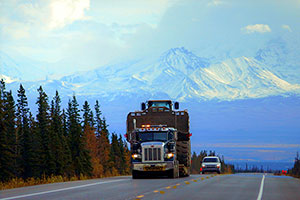Alaska Fuel Tax Bill Moves With Trucking Industry Support

Gov. Bill Walker’s bill to increase state fuel taxes has support from some industry groups it would directly affect, including the Alaska Trucking Association.
It also is the only tax bill among a suite of revenue proposals by the administration to help close the $3.5 billion-plus budget deficit to have moved out of a single committee so far.
The Senate Transportation Committee passed the bill onto the Finance Committee last week with lukewarm support on a 3-2 vote.
Committee Chairman Peter Micciche, a Republican senator from Soldotna, said he was for moving the bill to Finance for further vetting but not necessarily in favor of the bill itself.
Senate Bill 132, and mirror House Bill 249, would raise the per-gallon state fuel taxes as follows: highway fuel tax from 8 cents to 16 cents; marine fuel tax from 5 cents to 10 cents; aviation gasoline from 4.7 cents to 10 cents; and jet fuel from 3.2 cents to 10 cents.
The legislation would correspondingly increase the per-gallon highway fuel tax rebate for off-road use from 6 cents to 12 cents.
In all, the tax hikes are projected to raise $49 million per year, according to the Revenue Department.
Leaders of the Associated General Contractors of Alaska, Alaska Airmen Association, Alaska Trucking Association and the Alaska Region of the Aircraft Owners and Pilots Association supported the tax increases in letters to House and Senate committees.
Alaska Trucking Association Executive Director Aves Thompson wrote to Senate Transportation that the tax hike is part of a “durable, long-term fiscal plan” for the state.
“The Alaska Trucking Association has long supported a fuel tax increase if the funds could be dedicated to transportation needs,” he wrote. “We realize that this won’t happen in this bill but feel strongly that we need to help to resolve the fiscal issues by doing our part.”
Michael Thompson, owner of Anchorage taxi service Checker Cab, wrote in opposition to the tax increase. He estimated doubling the highway fuel tax would “burden each driver an additional $325 per year.”
Alaska’s 8 cents-per-gallon highway fuel tax is the lowest in the nation. The national average for state highway fuel taxes is 20 cents per gallon, according to the American Petroleum Institute, while the federal tax is 18 cents per gallon.
Alaska’s highway tax hasn’t been raised since 1970, Transportation Commissioner Marc Luiken wrote in a letter informing the committees on the legislation.
The 3.2 cents-per-gallon jet fuel tax is the 32nd lowest in the country, according to the Tax Foundation, a national policy research group.
Alaska collected $41.8 million from fuel taxes in fiscal 2015. Those fuel taxes accounted for 3.5% of all state taxes last fiscal year, according to Revenue.
SB 132 moved out of Senate Transportation with limiting amendments added by the committee, including a sunset date of July 1, 2018, and a provision reverting the taxes to previous amounts if the average price for Alaska North Slope crude is more than $85 per barrel in the previous calendar year. At that oil price, the state’s need for other revenue sources would be diminished, committee members reasoned.
“If we reduce our budget as we have planned, we would have more revenue than we need at those [oil] price ranges, and I think that’s the right place to promise Alaskans that we would be returning some of this revenue,” Micciche said.




